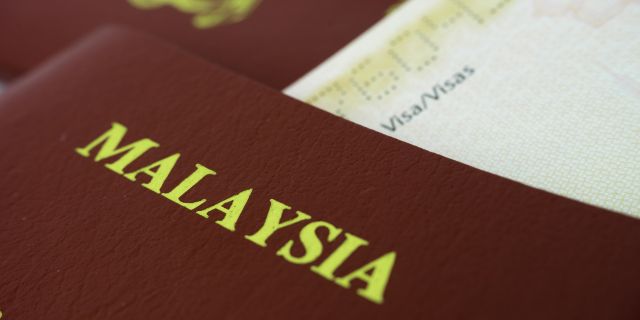Version: CN
Is your family member a new or future student who plans to study in Malaysia? This is for you! Our global strategic advisor, Taco Heidinga, is excited to release his exclusive E-book that covers everything about Malaysia.

Fill in your information below and get your E-book for FREE!
Are you dreaming of a world-class education but worried about sky-high tuition fees and overwhelming cultural differences?
Many aspiring students face this dilemma. Imagine a place where you can get a globally recognized degree, immerse yourself in a vibrant, multicultural environment, and enjoy a fantastic quality of life without breaking the bank.
That place is Malaysia—a hidden gem in Southeast Asia that’s rapidly becoming a top choice for international students.
But what makes it so special? Let’s dive into the many reasons why international students are falling in love with studying in Malaysia.
What is so Special About Malaysia Education?
- 1. Affordable, High-Quality Education
- 2. Globally Recognized Degrees
- 3. Multicultural and Welcoming Environment
- 4. Safe and Stable Country
- 5. Vibrant Student Life and Culture
- 6. Career Opportunities and Internships
- 7. English Widely Spoken
- 8. Pathway to Other Countries
- 9. Strategic Location and Travel Opportunities
- 10. World-Class Facilities
- 11. Cost of Living for Students
- 12. Visa Requirements and Application Process
- 13. Tips for International Students
- FAQs
1. Affordable, High-Quality Education

One of the biggest draws for students is Malaysia’s winning combination of affordability and quality. Compared to traditional study destinations like the US, UK, or Australia, the cost of education in Malaysia is significantly lower.
a. Tuition Fees
Public Universities:
- Bachelor’s degrees: 2,000–4,500 EUR/year
- Master’s degrees: 500–4,000 EUR/year
- Some degrees in Medicine can cost as much as 27,000 EUR per academic year.
Source: Masters Portal
Private Universities:
- Bachelor’s degrees: 1,350–9,300 EUR/year
- Master’s degrees: 1,500–3,000 EUR/year
- Some degrees in Medicine can cost as much as 19,850 EUR per academic year.
Source: Masters Portal
b. Comparison Table: Average Annual Tuition Fees
| Country | Average Annual Tuition Fees (USD) |
| Malaysia | $2,000 – $9,300 |
| United States | $25,000 – $45,000 |
| United Kingdom | $15,000 – $35,000 |
| Australia | $20,000 – $45,000 |
Source: Masters Portal, QS Quacquarelli Symonds Limited, Times Higher Education (THE), Study Abroad Aide, tuition fees subject to change
As you can see, studying in Malaysia can save you a significant amount of money, allowing you to graduate with less debt and more financial freedom. The lower tuition fees do not come at the expense of quality.
Malaysian universities are well-regarded internationally, with many ranking among the top institutions in Asia. Universiti Malaya (UM), for example, is consistently ranked among the top 100 universities globally.
Moreover, several prestigious foreign universities have established branch campuses in Malaysia, offering the same quality education as their home campuses but at a fraction of the cost. Examples include Monash University Malaysia, the University of Nottingham Malaysia, and Heriot-Watt University Malaysia.
This means you can earn a globally recognized degree from a top-tier institution without the hefty price tag.
c. Scholarships
Malaysia offers numerous scholarships for international students, further reducing the financial burden.
Some notable scholarships include:
- Malaysia International Scholarship (MIS): For international students with excellent academic records, covering tuition fees and living expenses.
- ASEAN Undergraduate Scholarship: For top-performing ASEAN students, covering tuition fees.
- Star Education Fund: For Malaysian and international students, offering up to full tuition coverage.
- APU Merit Scholarship: Offers full funding for bachelor’s and master’s programs at Asia Pacific University, awarded to students with a CGPA of 3.70 or higher.
These scholarships, along with many others offered by individual universities, make studying in Malaysia even more accessible.
2. Globally Recognized Degrees

Malaysian universities offer degrees that are recognized and respected worldwide. Many institutions have partnerships with universities in the UK, Australia, the US, and other countries, allowing for credit transfers and dual-degree programs.
This means you can start your studies in Malaysia and then transfer to a partner university overseas to complete your degree, or even earn two degrees simultaneously.
For example, the University of Nottingham Malaysia offers programs where students can spend part of their studies at the UK campus.
This provides a fantastic opportunity to gain international experience and broaden your horizons while benefiting from the lower cost of living in Malaysia.
Moreover, the Malaysian Qualifications Agency (MQA) ensures that educational standards are maintained at a high level, so you can be confident that your degree will be of excellent quality.
According to Pearson PTE, the MQA sets language requirements for international students, ensuring they have the necessary English proficiency to succeed in their studies.
3. Multicultural and Welcoming Environment

Malaysia is a melting pot of cultures, with Malay, Chinese, Indian, and indigenous communities coexisting harmoniously. This multiculturalism is one of the country’s greatest strengths, creating a vibrant and dynamic society that’s incredibly welcoming to foreigners.
As an international student, you’ll have the opportunity to immerse yourself in a diverse range of traditions, languages, and cuisines. You’ll make friends from all over the world, broadening your perspectives and building a global network.
This multicultural environment is not only enriching on a personal level but also highly valuable in today’s interconnected world. Employers often seek graduates with international experience and cross-cultural communication skills, and studying in Malaysia provides ample opportunities to develop these competencies.
Malaysia’s strategic location within the Asia Pacific region positions it as a gateway to a diverse market, presenting international students with potential job opportunities and a valuable international perspective.
4. Safe and Stable Country

Malaysia is known for being a safe and stable country, with a low crime rate and a peaceful political environment. According to the Global Peace Index, Malaysia is ranked among the most peaceful countries in the world.
This makes it an ideal destination for international students, particularly those who may be living away from home for the first time.
The Malaysian government is committed to ensuring the safety and well-being of its citizens and visitors, and this is reflected in the country’s strong law enforcement and effective governance. As an international student, you can feel secure knowing that you’re studying in a country that values peace and stability.
As highlighted by the Times Higher Education (THE), Malaysia is a country in South-east Asia known for its natural beauty and diverse population, making it a safe and welcoming environment for students.
5. Vibrant Student Life and Culture

Studying in Malaysia is not just about academics but also about experiencing a rich and vibrant student life. Malaysian universities offer a wide range of extracurricular activities, clubs, and societies, catering to diverse interests.
Whether you’re into sports, music, drama, or community service, you’ll find plenty of opportunities to get involved and make the most of your time outside the classroom. This allows you to pursue your passions, develop new skills, and make lifelong friends.
Malaysia’s cultural diversity is also reflected in its festivals and celebrations. Throughout the year, you’ll have the chance to experience colorful festivals like Hari Raya, Chinese New Year, Deepavali, and many more.
These celebrations are a fantastic way to learn about different cultures and immerse yourself in the local way of life. As mentioned by Masters Portal, one of the things Malaysia is known for is constantly celebrating different holidays, offering a vibrant cultural experience for students.
6. Career Opportunities and Internships

Malaysia’s growing economy offers numerous career opportunities for graduates, particularly in sectors like technology, finance, and engineering. Many multinational companies have established operations in Malaysia, drawn by the country’s skilled workforce and business-friendly environment.
As an international student, you’ll have the chance to gain valuable work experience through internships and part-time jobs. This not only helps you develop practical skills but also enhances your employability after graduation. The Malaysian government allows international students to work up to 20 hours per week during semester breaks, providing a chance to earn some extra income and gain valuable work experience.
Moreover, many Malaysian universities have strong industry connections and offer career support services to help students find internships and job placements. For example, Universiti Teknologi Petronas (UTP) has close ties with PETRONAS, Malaysia’s national oil and gas company, providing students with unique opportunities for internships and research collaborations.
7. English Widely Spoken

While Bahasa Malaysia is the official language, English is widely spoken throughout the country, particularly in urban areas and within the education sector. Most university courses are taught in English, making it easy for international students to adapt to the academic environment.
This widespread use of English also facilitates daily life, from shopping and dining to navigating public transportation. You won’t have to worry about significant language barriers hindering your ability to communicate and integrate into Malaysian society.
The majority of courses in Malaysia are conducted in English, which facilitates a smoother transition for international students and helps them focus on their studies without language barriers.
8. Pathway to Other Countries

Studying in Malaysia can be a stepping stone to further educational opportunities in other countries. As mentioned earlier, many Malaysian universities have partnerships with institutions in the UK, Australia, the US, and other countries, allowing for credit transfers and dual-degree programs.
This means you can start your studies in Malaysia, benefiting from the lower tuition fees and living costs, and then transfer to a partner university overseas to complete your degree. This not only provides a cost-effective pathway to a global education but also allows you to experience different cultures and educational systems.
9. Strategic Location and Travel Opportunities

Malaysia’s strategic location in the heart of Southeast Asia makes it an excellent base for exploring the region. With affordable air travel and well-connected transportation networks, you can easily visit neighboring countries like Thailand, Singapore, Indonesia, Vietnam, and the Philippines during your semester breaks.
This provides an incredible opportunity to broaden your horizons, experience different cultures, and create unforgettable memories. Imagine spending your weekends exploring ancient temples in Thailand, relaxing on the beaches of Bali, or experiencing the vibrant city life of Singapore.
Malaysia’s strategic location within the Asia Pacific region positions it as a gateway to a diverse market, presenting international students with valuable travel and exploration opportunities.
10. World-Class Facilities

Malaysian universities boast modern, state-of-the-art facilities that rival those of top institutions around the world. From well-equipped laboratories and libraries to cutting-edge research centers and recreational facilities, you’ll have access to everything you need to succeed in your studies and enjoy a well-rounded student experience.
For example, Universiti Teknologi Malaysia (UTM) has invested heavily in its research infrastructure, with a focus on engineering, science, and technology. Similarly, Universiti Putra Malaysia (UPM) is renowned for its agricultural research facilities, reflecting its origins as an agricultural college.
a. Top Universities in Malaysia
Malaysia is home to numerous world-class universities, both public and private. Here are some of the top institutions, according to QS World University Rankings:
| Rank | University | Location |
| 60 | Universiti Malaya (UM) | Kuala Lumpur |
| 138 | Universiti Kebangsaan Malaysia (UKM) | Bangi |
| 146 | Universiti Sains Malaysia (USM) | Gelugor |
| 148 | Universiti Putra Malaysia (UPM) | Serdang |
| =181 | Universiti Teknologi Malaysia | Skudai |
| 251 | Taylor’s University | Subang Jaya |
| =265 | UCSI University | Kuala Lumpur |
| =269 | Universiti Teknologi PETRONAS (UTP) | Seri Iskandar |
| =516 | INTI International University | Nilai |
| =539 | Sunway University | Petaling Jaya |
These universities offer a wide range of programs across various disciplines, from engineering and technology to business, medicine, and the humanities. They are known for their academic excellence, research contributions, and strong industry connections.
b. Popular Courses for International Students
International students in Malaysia can choose from a diverse array of courses that cater to a wide range of interests and career aspirations. Some of the most popular courses include:
- Medicine: Malaysian medical schools are internationally acclaimed for their comprehensive programs and state-of-the-art facilities.
- Engineering and Architecture: These programs offer hands-on training and are designed to equip students with the skills needed to excel in these rapidly evolving fields.
- Business and Marketing: Malaysian business schools offer internationally recognized programs that encompass the latest trends in global commerce.
- Information Technology and Computer Science: These courses are highly relevant given the digital transformation sweeping across industries.
- Hospitality, Tourism, and Culinary Arts: Malaysia’s thriving tourism industry makes it an ideal location for these programs.
- Arts and Design: These courses foster creativity and innovation, encouraging students to explore various artistic mediums.
11. Cost of Living for Students

One of the most attractive aspects of studying in Malaysia is the affordable cost of living. According to Masters Portal, students should budget between 450 and 800 EUR per month to cover living expenses.
Here’s a breakdown of typical monthly costs:
- Accommodation: 350–700 EUR/month depending on the type of housing
- Utilities: 50–70 EUR/month
- Food and groceries: 200–350 EUR/month
- Transportation: 21 EUR for a monthly pass
- Medical insurance: 210 EUR/year
These costs are significantly lower than in many other popular study destinations, making Malaysia an excellent choice for students on a budget.
The Immigration Department of Malaysia also notes that the Student Pass costs RM60.00 per year, and visa rates apply by country but do not exceed RM50.00 for each visa issued.
12. Visa Requirements and Application Process

To study in Malaysia, international students need to obtain a Student Pass. The application process is relatively straightforward and can be done online through the Education Malaysia Global Services (EMGS) website.
Here are the general steps involved:
- Apply to a Malaysian university and receive an offer letter.
- Submit your Student Pass application through EMGS.
- Pay the required fees.
- Track your application status online.
- Upon approval, you’ll receive a Visa Approval Letter (VAL).
- If required, obtain a Single Entry Visa (SEV) from the nearest Malaysian embassy or consulate.
- Travel to Malaysia and undergo a medical screening.
- Submit your passport to your university for Student Pass endorsement.
The Immigration Department of Malaysia provides detailed information on the Student Pass application procedure and the required documents on their website.
13. Tips for International Students
Here are some helpful tips for international students planning to study in Malaysia:
- Learn some basic Bahasa Malaysia phrases: While English is widely spoken, knowing some basic Malay phrases will enhance your experience and help you connect with locals.
- Immerse yourself in the local culture: Take advantage of the opportunity to explore Malaysia’s diverse culture, try new foods, and participate in local festivals.
- Connect with other international students: Join international student organizations and participate in events to build a support network.
- Manage your finances wisely: Create a budget and track your expenses to ensure you’re making the most of your resources.
- Stay informed about visa requirements: Keep track of your visa status and ensure you renew your Student Pass on time.
- Take advantage of travel opportunities: Explore Malaysia and neighboring countries during your semester breaks.
- Stay safe and healthy: Be aware of your surroundings, take necessary safety precautions, and ensure you have adequate health insurance coverage.
FAQs
1. What is the average cost of studying in Malaysia for international students?
The average cost varies depending on the university and program, but generally, tuition fees range from $2,000 to $9,300 per year. Living expenses range from 450 to 800 EUR per month.
2. Is Malaysia a safe country for international students?
Yes, Malaysia is considered a safe and stable country with a low crime rate. It’s ranked among the most peaceful countries globally.
3. Can international students work part-time in Malaysia?
Yes, international students with a valid Student Pass are allowed to work up to 20 hours per week during semester breaks.
4. What are the visa requirements for studying in Malaysia?
International students need to obtain a Student Pass through the Education Malaysia Global Services (EMGS) website. The process involves applying to a university, receiving an offer letter, submitting the Student Pass application, paying fees, and obtaining a Visa Approval Letter (VAL).
5. Are Malaysian degrees recognized internationally?
Yes, degrees from Malaysian universities are recognized and respected worldwide. Many institutions have partnerships with universities in other countries, and the Malaysian Qualifications Agency (MQA) ensures high educational standards.
6. What are the best universities in Malaysia for international students?
Some of the top universities include Universiti Malaya (UM), Universiti Kebangsaan Malaysia (UKM), Universiti Sains Malaysia (USM), Universiti Putra Malaysia (UPM), and Universiti Teknologi Malaysia (UTM).
7. What are the most popular courses for international students in Malaysia?
Popular courses include Medicine, Engineering and Architecture, Business and Marketing, Information Technology and Computer Science, Hospitality, Tourism, and Culinary Arts, and Arts and Design.

Malaysia offers an exceptional combination of affordable, high-quality education, a multicultural and welcoming environment, a safe and stable society, and a vibrant student life.
With its globally recognized degrees, world-class facilities, and strategic location, it’s no wonder that international students are increasingly choosing Malaysia as their preferred study destination.
So why not take the leap and embark on an exciting educational adventure in this dynamic and diverse country?
Are you ready to live in Malaysia for your children’s education journey? Contact us now! Let us assist you in exploring the best house solution for your family.
Continue Reading:
- Property Purchase and Rental Price in Malaysia Market.
- Why Malaysia is the Perfect Destination for Foreign Investors?
- 6 Factors That Attracts Foreign Workers to Malaysia.
Citation and Reference
- Masters Portal
- The Ultimate Guide to Studying in Malaysia in 2025
- Tuition Fees and Living Costs in Malaysia in 2025
2. QS Quacquarelli Symonds Limited
3. Times Higher Education (THE)
4. Study Abroad Aide
5. StudyMalaysia
6. AECC Global
7. EasyUni
8. Pearson PTE
10. Immigration Department of Malaysia
11. Education Malaysia Global Services (EMGS)
